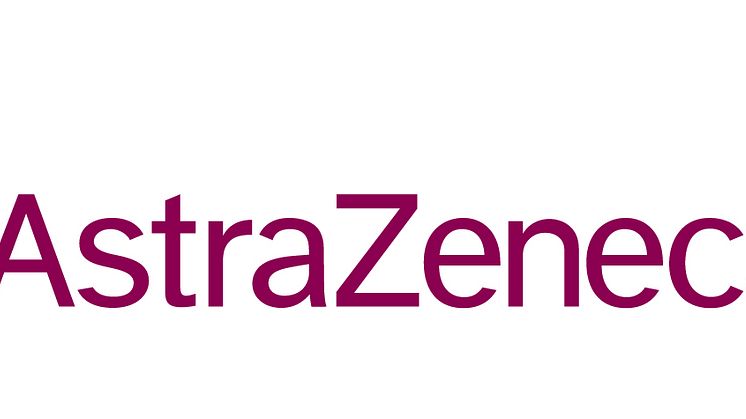
Pressmeddelande -
Positive results from Fasenra Phase II trial in hypereosinophilic syndrome published in New England Journal of Medicine
A Phase II trial has demonstrated that Fasenra (benralizumab) can achieve near-complete depletion of eosinophils and improve clinical outcomes in hypereosinophilic syndrome (HES). The results are published in the New England Journal of Medicine.
In the randomised phase of the 20-patient trial, the primary efficacy endpoint was the percentage of patients who reduced their absolute blood eosinophil counts by 50% or more at week 12.1 This was achieved by 90% of patients treated with Fasenra compared with 30% of patients treated with placebo, a statistically significant difference.
In the open-label phase of the trial, 74% of patients maintained a reduction in eosinophil counts and had clinical improvements in their symptoms through week 48.1 Of these patients, 64% were able to taper background HES medications. In patients from whom tissue biopsies were obtained (gastrointestinal tract and skin) there was near-complete depletion of eosinophils following treatment with Fasenra.
Mene Pangalos, Executive Vice President and President BioPharmaceuticals R&D, said: “We are encouraged by these trial results for Fasenra in hypereosinophilic syndrome and the data are potentially important given the limited treatment options for this debilitating disease.”
HES is a group of rare, potentially fatal disorders characterised by high numbers of eosinophils in blood and tissues which can cause progressive, potentially life-threatening organ damage.2,3 At the start of the Phase II trial, patients had significantly elevated levels of blood eosinophils ranging from 1,000 to 21,580 cells per μl.1
During the 48-week treatment period, the three most frequently reported adverse events attributed to Fasenra included headache, elevated lactate dehydrogenase (LDH) concentration and chills.1 The observed increases in LDH occurred after the first dose of Fasenra and resolved within 48 hours. The trial was a collaboration between AstraZeneca and the US National Institute of Allergy and Infectious Diseases (NIAID), part of the US National Institutes of Health.
Fasenra is currently approved as an add-on maintenance treatment for severe, eosinophilic asthma in the US, EU, Japan and other countries. The US Food and Drug Administration (FDA) granted Orphan Drug Designation for Fasenra for the treatment of HES in February 2019.
– ENDS –
NOTES TO EDITORS
About HES
HES is a group of rare disorders characterised by high numbers of eosinophils (≥1,500 cells per μl), a type of white blood cell, in blood and tissues which can cause progressive damage to any organ and, if left untreated, can be fatal.2,3 HES most commonly impacts the skin, heart, lungs, gastrointestinal tract and central nervous system.3The symptoms of HES may include cough, fever, fatigue, asthma, difficulty breathing, wheezing, recurrent upper respiratory tract infections, abdominal pain, vomiting, diarrhoea, skin rashes, arthritis, muscle aches and joint pain.3
The goal of HES treatment is to deplete eosinophils in the blood and tissues, prevent organ damage and slow disease progression.2 Although some patients with HES have a genetic abnormality involving platelet-derived growth factor receptor (PDGFR) that renders them responsive to the tyrosine kinase inhibitor, imatinib,4 treatment options for patients without PDGFR mutations are limited, have varying efficacy and are associated with adverse events.1
About the Phase II trial
The trial was conducted by the US National Institute of Allergy and Infectious Diseases (NIAID) in collaboration with AstraZeneca as a randomised, double-blind, placebo-controlled trial of benralizumab (30 mg sub-cutaneous, administered every four weeks) in 20 symptomatic patients with a diagnosis of platelet-derived growth factor receptor A (PDGFRA)-negative HES (non-leukemic) and an eosinophil count ≥1,000 cells per μl on stable HES therapy.1 This was followed by an open-label segment during which background HES therapy could be tapered as tolerated.
The primary efficacy endpoint of the randomised phase was the percentage of patients who reduced their absolute blood eosinophil counts by 50% or more at week 12.1 Secondary endpoints included reduction in eosinophil counts at 12 weeks, frequency and severity of adverse events, changes in bone marrow and tissue eosinophilia, and reduction in HES therapy at 48 weeks. Exploratory endpoints included assessment of clinical and laboratory predictors of response.
About Fasenra
Fasenra (benralizumab) is a monoclonal antibody that binds directly to IL-5 receptor α on eosinophils and attracts natural killer cells to induce rapid and near-complete depletion of eosinophils via apoptosis (programmed cell death).5,6
Fasenra is AstraZeneca’s first respiratory biologic, now approved as an add-on maintenance treatment in severe, eosinophilic asthma in the US, EU, Japan and other countries, with further regulatory reviews ongoing. Where approved, Fasenra is available as a fixed-dose subcutaneous injection via a prefilled syringe administered once every four weeks for the first three doses, and then once every eight weeks thereafter. Fasenra is also being studied in severe nasal polyposis.
Fasenra was developed by AstraZeneca and is in-licensed from BioWa, Inc., a wholly-owned subsidiary of Kyowa Hakko Kirin Co., Ltd., Japan.
About AstraZeneca in Respiratory Disease
Respiratory is one of AstraZeneca’s main therapy areas, and our medicines reached more than 18 million patients as maintenance therapy in 2018. AstraZeneca’s aim is to transform asthma and COPD treatment through inhaled combinations at the core of care, biologics for the unmet needs of specific patient populations, and scientific advancements in disease modification.
The Company is building on a 40-year heritage in respiratory disease and AstraZeneca’s capability in inhalation technology spans pressurised metered-dose inhalers and dry powder inhalers, as well as the Aerosphere Delivery Technology. The company also has a growing portfolio of respiratory biologics including Fasenra (anti-eosinophil, anti‒IL-5Rɑ), now approved for severe, eosinophilic asthma and in development for severe nasal polyposis, and tezepelumab (anti-TSLP), which has been granted Breakthrough Therapy designation by the US Food and Drug Administration in patients with severe asthma, and is in Phase III trials. AstraZeneca’s research is focused on addressing underlying disease drivers focusing on the lung epithelium, lung immunity and lung regeneration.
About AstraZeneca
AstraZeneca is a global, science-led biopharmaceutical company that focuses on the discovery, development and commercialisation of prescription medicines, primarily for the treatment of diseases in three therapy areas - Oncology, Cardiovascular, Renal & Metabolism and Respiratory. AstraZeneca operates in over 100 countries and its innovative medicines are used by millions of patients worldwide. For more information, please visit astrazeneca.comand follow us on Twitter @AstraZeneca.
| Media Relations | ||
| Gonzalo Viña | UK/Global | +44 203 749 5916 |
| Rob Skelding | UK/Global | +44 203 749 5821 |
| Matt Kent | UK/Global | +44 203 749 5906 |
| Jennifer Hursit | UK/Global | +44 203 749 5762 |
| Christina Malmberg Hägerstrand | Sweden | +46 8 552 53 106 |
| Michele Meixell | US | +1 302 885 2677 |
| Investor Relations | ||
| Thomas Kudsk Larsen | +44 203 749 5712 | |
| Henry Wheeler | Oncology | +44 203 749 5797 |
| Christer Gruvris | BioPharma - Cardiovascular; Metabolism | +44 203 749 5711 |
| Nick Stone | BioPharma - Respiratory; Renal | +44 203 749 5716 |
| Josie Afolabi | Other | +44 203 749 5631 |
| Craig Marks | Finance; Fixed Income | +44 7881 615 764 |
| Jennifer Kretzmann | Retail Investors; Corporate Access | +44 203 749 5824 |
| US toll-free | +1 866 381 72 77 |
1.Kuang FL, Legrand F, Makiya MA, et al. Benralizumab Treatment for PDGFRA-negative Hypereosinophilic Syndrome. N Engl J Med.
2.American Partnership for Eosinophilic Disorders. Hypereosinophilic Syndromes. Accessed 2 February 2019. apfed.org/about-ead/hypereosinophilic-syndrome/.
3.American Partnership for Eosinophilic Disorders. APFED Hypereosinophilic Syndromes Brochure. December 2017. Accessed 2 February 2019. apfed.org/wp-content/uploads/2017/12/APFED_HES_bro_final.pdf.
4.National Center for Biotechnology Information Resources. PDGFRA platelet derived growth factor receptor alpha [Homo sapiens (human)]. Accessed 13 March 2019. ncbi.nlm.nih.gov/gene/5156
5.Kolbeck R, Kozhich A, Koike M, et al. MEDI-563, a humanized anti–IL-5 receptor a mAb with enhanced antibody-dependent cell-mediated cytotoxicity function. J Allergy Clin Immunol. 2010 Jun;125(6):1344-1353.e2.
6.Pham TH, Damera G, Newbold P, Ranade K. Reductions in eosinophil biomarkers by benralizumab in patients with asthma. Respir Med. 2016; 111:21-29.
Ämnen
Kategorier
Om AstraZeneca
AstraZeneca är ett globalt, innovationsdrivet bioläkemedelsföretag med fokus på forskning, utveckling och marknadsföring av receptbelagda läkemedel, primärt för behandling av sjukdomar inom tre huvudsakliga terapiområden: cancer, kardiovaskulära sjukdomar, njursjukdomar och metabola sjukdomar och sjukdomar i andningsvägarna. Bolaget är också selektivt aktivt inom autoimmunitet, neurovetenskap och infektion. AstraZeneca bedriver verksamhet i över 100 länder och dess innovativa läkemedel används av miljontals patienter över hela världen.
Mer information finns på: www.astrazeneca.com och www.astrazeneca.se. Du kan även följa oss på twitter https://twitter.com/AstraZenecaSE


